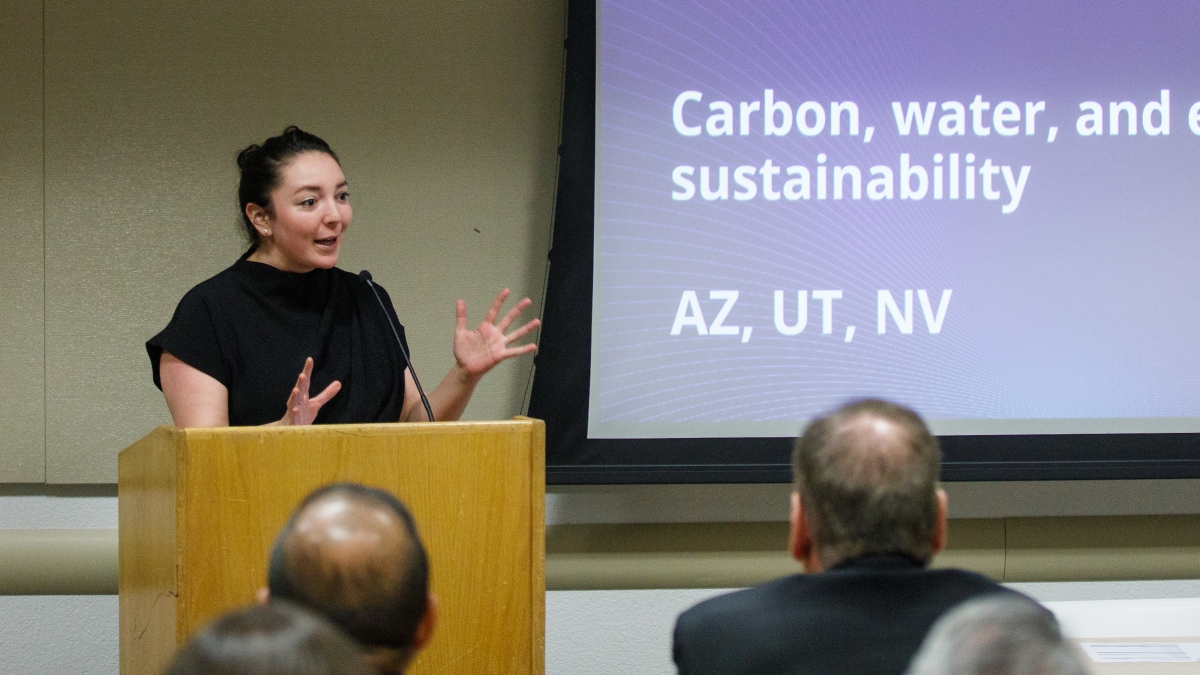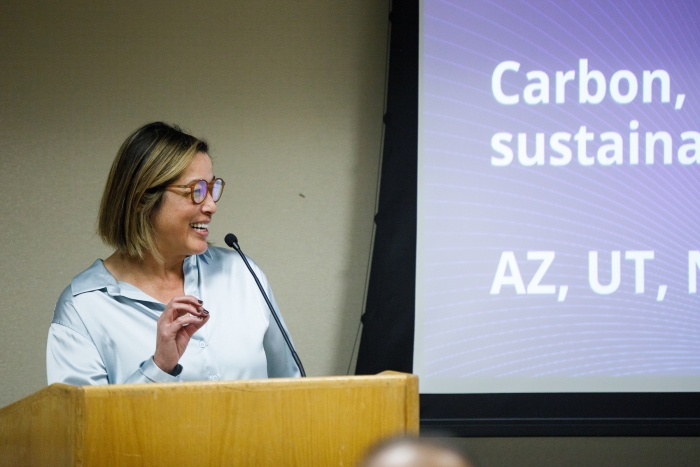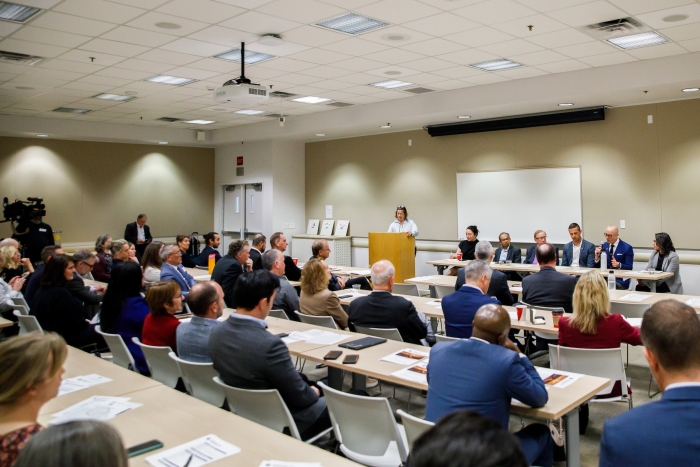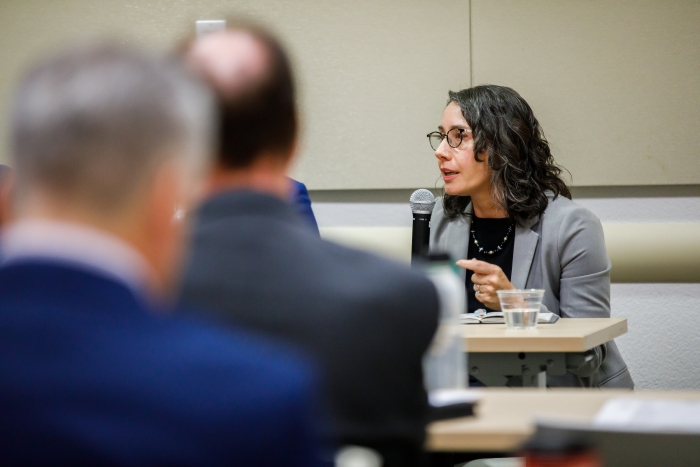NSF announces new partners in ASU-led climate, economy initiative

Justina Gallegos, deputy director for industrial innovation at the White House Office of Science and Technology Policy, speaks at an event for the Southwest Sustainability Innovation Engine at Intel’s Chandler campus on Monday, March 4, in Chandler, Arizona. Photo by Andy DeLisle/ASU Knowledge Enterprise
The U.S. National Science Foundation has announced three new partners in an Arizona State University-led initiative to transform the desert Southwest’s climate challenges into economic opportunities.
Ecolab, Hydrosat and the U.S. Green Building Council have joined NSF Engines: Southwest Sustainability Innovation Engine, or SWSIE. The initiative unites academic, community, nonprofit and industry partners throughout Arizona, Nevada and Utah to establish the Southwest as a leader in carbon capture, water security and renewable energy, and bring high-wage industries to the region.
The announcement was made at an event held at Intel in Chandler that included representatives from the National Science Foundation and the White House Office of Science and Technology Policy.
“The Southwest Sustainability Innovation Engine embodies the (U.S.) president's vision of an American economy where the country's largest problems and climate change are addressed, not by outsourcing our talent and expertise, but by investing right in the heart of communities through place-based investment,” said Justina Gallegos, deputy director for industrial innovation at the White House Office of Science and Technology Policy.
“This requires a new approach that builds partnerships; that brings together private industry, venture capital, state and local governments, institutions of higher education — including community colleges and technical schools — labor unions, tribal organizations and nonprofit organizations to transform their communities and regions over the next decade,” she said.
Florence Rabanal, NSF Regional Innovation Engines program director, welcomed Ecolab, Hydrosat and the U.S. Green Building Council to a coalition of more than 50 partners in SWSIE.
“We're very, very pleased to have you part of the NSF’s portfolio and excited to have ASU’s leadership,” Rabanal said.
NSF’s Regional Innovation Engines is a first-of-its-kind program designed to coalesce local and regional partners to rapidly develop and deploy solutions-inspired research and advance U.S. competitiveness in their respective focal areas. Overseen by the directorate for technology, innovation and partnerships — the NSF’s first new directorate in more than 30 years — the program is a key effort to establish regional economic, technological and societal leadership in areas highlighted in the CHIPS and Science Act.
In January, the NSF announced SWSIE as one of the 10 inaugural Regional Innovation Engines.
Rabanal and Gallegos visited Chandler as a stop on a tour of the newly established Regional Innovation Engines across the nation to champion investment in the program and its potential.
SWSIE’s initial development and growth is funded by the NSF with $15 million over the next two years. The engine can be renewed for up to 10 years with $160 million in additional funding available for each Regional Engine.
“We are trying to make sure that the Southwest remains a region in which all people thrive and the economy flourishes,” said Peter Schlosser, vice president and vice provost of Global Futures at ASU, as well as director of the Julie Ann Wrigley Global Futures Laboratory and the principal investigator of SWSIE.
Schlosser outlined the three major thrusts of SWSIE: research and development, technology translation, and economic development. He estimated that these activities could generate $2.7 billion in economic impact for the Southwest, along with 15,000 new jobs and $900 million in tax revenue within 10 years.
Ecolab, Hydrosat and the U.S. Green Building Council all bring unique strengths to help realize SWSIE’s potential.
“Ecolab is excited to collaborate with Arizona State University through the NSF grant on innovations that will deliver economic growth while reducing water and energy intensity in the region,” said Calvin Emanuel, vice president and general manager of Sustainable Growth Solutions at Ecolab. “By embracing creative strategies for water reuse, industries can achieve both their business and sustainability goals.”
“The Southwest U.S. faces some of the greatest climate challenges with respect to water availability, the ability to grow food and wildfire risk while sustaining a growing population,” said Joshua B. Fisher, science lead for Hydrosat. “Hydrosat is built to solve fast-moving challenges such as these with the best possible data, and we are excited to provide an avenue for the foremost young talent to make key contributions towards solving climate issues immediately.
“The U.S. Green Building Council Mountain Region is pleased to announce its support of the Southwest Sustainability Innovation Engine as an official partner,” said Hilari Varnadore, vice president of LEED for Cities at the U.S. Green Building Council. “We recognize the urgency and economic value of bringing new technologies to market that enable high-performance buildings, create healthy and resilient communities, and that can be adopted widely for broad impact.”
We are trying to make sure that the Southwest remains a region in which all people thrive and the economy flourishes.
Peter SchlosserVice president and vice provost of Global Futures at ASU
Leaders from industry, academia and local and federal governments gathered at Intel's Chandler campus to discuss the opportunities presented by SWSIE. Following the announcement of the new partners, the event hosted a panel discussion with representatives from Ecolab, ASU, SRP, Intel, Hydrosat and the White House.
The panel focused on technological solutions poised to invigorate the Southwest, with water reuse and solar energy storage solutions emerging as top priorities. The panelists also discussed workforce development and talent pipeline and stressed the importance of partnerships in pursuing SWSIE’s goals for the region.
“We are so excited to be working with you and also thank our existing partners like SRP and Intel because we have an unprecedented opportunity here to put these companies which are striving towards ambitious sustainability and job goals for our region together with our researchers and our students and a new generation of workers who will have the green skills to carry out the vision of these companies,” said Diane Pataki, deputy CEO of SWSIE and Foundation Professor with the School of Sustainability in ASU’s College of Global Futures. “So, we hope to be a connector linking the researchers at all of the institutions throughout the region.
"There's amazing expertise to all of these institutions that we hope you can take advantage of, and we want to provide our students with the training that they need so they can come and work on these initiatives.”
More Environment and sustainability

Rethinking Water West conference explores sustainable solutions
How do you secure a future with clean, affordable water for fast-growing populations in places that are contending with unending drought, rising heat and a lot of outdated water supply infrastructure…
Meet the young students who designed an ocean-cleaning robot
A classroom in the middle of the Sonoran Desert might be the last place you’d expect to find ocean research — but that’s exactly what’s happening at Harvest Preparatory Academy in Yuma, Arizona.…

From ASU to the Amazon: Student bridges communities with solar canoe project
While Elizabeth Swanson Andi’s peers were lining up to collect their diplomas at the fall 2018 graduation ceremony at Arizona State University, she was on a plane headed to the Amazon rainforest in…




